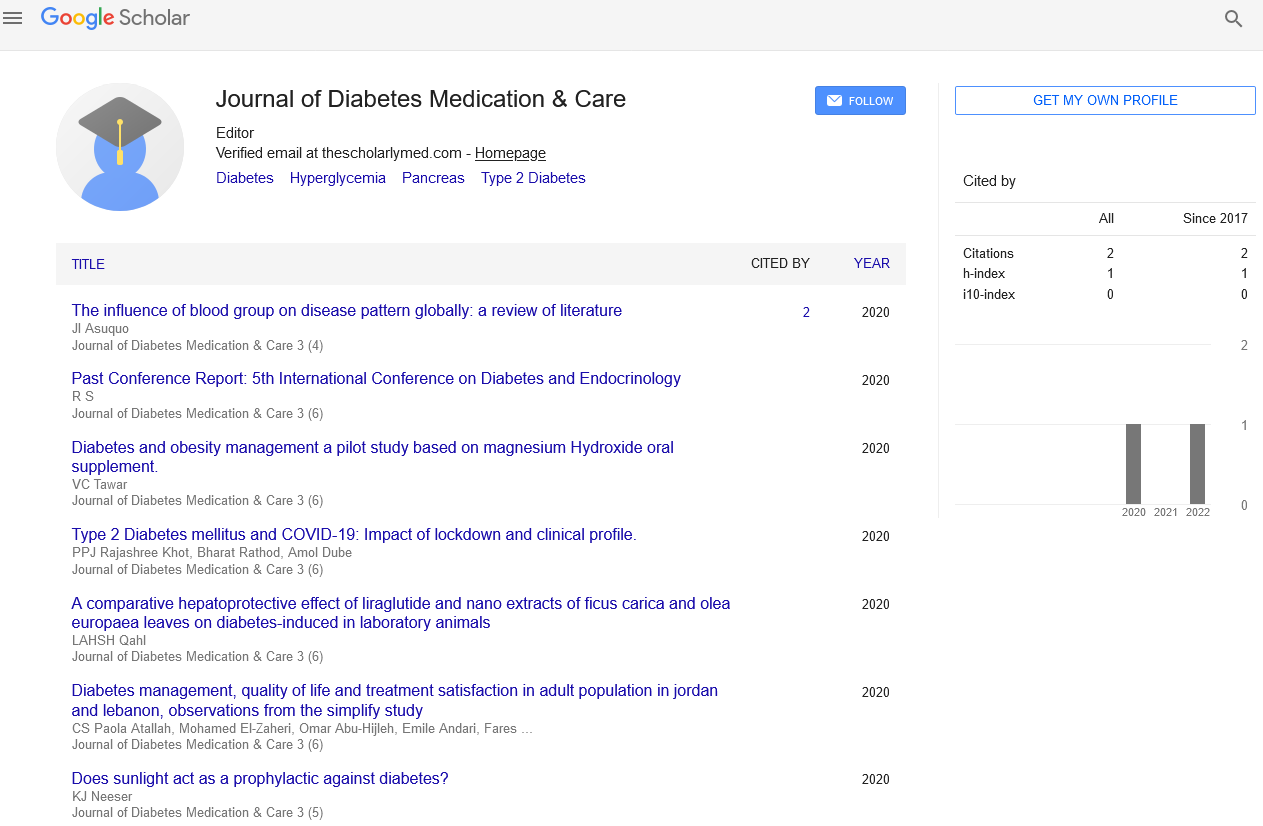Opinion Article - Journal of Diabetes Medication & Care (2024) Volume 7, Issue 5
The Cognitive Impact of Diabetes Medications: Exploring the Intersection of Metabolism and Mind
- Corresponding Author:
- Suxg Cao
Department of Diabetology, University in California, California, USA
E-mail: suxgao@sicau.edu.cn
Received: 06-Sep-2024, Manuscript No. JDMC-24-148355; Editor assigned: 09-Sep-2024, PreQC No. JDMC-24-148355 (PQ); Reviewed: 23-Sep-2024, QC No. JDMC-24-148355; Revised: 18-Oct-2024, Manuscript No. JDMC-24-148355 (R); Published: 25-Oct-2024, DOI: 10.37532/JDMC.2024.7(5).263-265
Introduction
Diabetes is a chronic condition that affects millions worldwide, with significant implications not only for physical health but also for cognitive function. While the primary focus of diabetes management is often on glycemic control, there is growing interest in understanding how various diabetes medications influence cognitive health. This article explores the cognitive impact of diabetes medications, examining both the potential benefits and adverse effects, as well as the underlying mechanisms involved.
Description
The diabetes-cognition connection
Cognitive impairment is a common complication in individuals with diabetes, particularly in those with type 2 diabetes. Research suggests that diabetes may contribute to an increased risk of cognitive decline and dementia. Factors such as chronic hyperglycemia, insulin resistance, and the presence of comorbid conditions like hypertension and obesity can exacerbate cognitive decline.
Cognitive impairment and diabetes
Several studies have established a link between diabetes and cognitive dysfunction. Individuals with diabetes are at a higher risk for:
Mild Cognitive Impairment (MCI): A transitional stage between normal cognitive aging and dementia, MCI often manifests as forgetfulness and difficulty concentrating.
Dementia: Types of dementia, particularly vascular dementia and Alzheimer’s disease, have been shown to occur more frequently in diabetic patients.
Understanding how diabetes medications can influence cognitive outcomes is crucial for developing effective treatment plans that support both metabolic and cognitive health.
Classes of diabetes medications and their cognitive effects
Diabetes medications can be broadly categorized into several classes, each with unique mechanisms of action and potential cognitive effects.
Metformin
Metformin is the first-line treatment for type 2 diabetes and is known for its glucose lowering effects. Emerging evidence suggests that metformin may have neuroprotective properties.
Cognitive benefits: Studies have indicated that metformin may help preserve cognitive function in older adults with diabetes. It may reduce the risk of dementia and MCI through mechanisms such as improved insulin sensitivity and reduced inflammation.
Mechanisms: Metformin’s potential neuroprotective effects may be attributed to its ability to enhance Brain Derived Neurotrophic Factor (BDNF), a protein that supports neuron growth and function.
Sulfonylureas
Sulfonylureas, such as glimepiride and glyburide, stimulate insulin secretion from pancreatic beta cells. While effective for glycemic control, their impact on cognition is more contentious.
Cognitive concerns: Some studies suggest a potential association between sulfonylureas and cognitive decline, particularly due to the risk of hypoglycemia. Severe hypoglycemic episodes can lead to temporary cognitive impairment and may have long term consequences.
Thiazolidinediones (TZDs)
TZDs, including pioglitazone and rosiglitazone, improve insulin sensitivity but are also associated with several adverse effects.
Cognitive effects: While some research has indicated that pioglitazone may offer neuroprotective effects and improve cognitive function, other studies have raised concerns about the potential for cognitive decline with long term use.
Inflammation and cognition: TZDs may exert their effects through anti-inflammatory pathways, which could be beneficial for brain health, although the evidence remains mixed.
Dipeptidyl Peptidase-4 (DPP-4) inhibitors: DPP-4 inhibitors, such as sitagliptin and saxagliptin, work by increasing levels of incretin hormones, which help regulate glucose metabolism.
Neutral cognitive effects: Most studies suggest that DPP-4 inhibitors do not significantly impact cognitive function, making them a relatively neutral option in terms of cognitive health.
Sodium-Glucose Co-Transporter 2 (SGLT2) inhibitors
SGLT2 inhibitors, such as dapagliflozin and empagliflozin, have gained attention for their cardiovascular benefits, but their impact on cognition is still being explored.
Potential benefits: Some preliminary studies suggest that SGLT2 inhibitors may help reduce the risk of cognitive decline, potentially through mechanisms related to improved metabolic control and reduced inflammation.
Insulin
Insulin therapy remains essential for managing both type 1 and advanced type 2 diabetes.
Cognitive impacts: The cognitive effects of insulin therapy are complex. While insulin is crucial for brain function, excessive insulin or poorly managed therapy can lead to hypoglycemia, which may impair cognitive function.
Mechanisms linking diabetes medications and cognitive function
Understanding how diabetes medications affect cognition requires exploring several biological pathways:
Glucose regulation: Effective glucose control is critical for cognitive health. Chronic hyperglycemia can lead to oxidative stress and inflammation, damaging neurons and impairing cognitive function. Medications that improve glycemic control can help mitigate these risks.
Inflammation: Chronic inflammation is a significant factor in both diabetes and cognitive decline. Many diabetes medications have anti-inflammatory properties, which may contribute to their neuroprotective effects.
Neuroprotection: Certain medications, such as metformin and some SGLT2 inhibitors, may enhance neuroprotection by promoting neurogenesis, improving BDNF levels, and reducing apoptosis (cell death) in neuronal cells.
Vascular health: Vascular health is closely linked to cognitive function. Diabetes medications that improve blood pressure, lipid levels, and vascular function can indirectly benefit cognitive health by reducing the risk of vascular dementia.
The importance of holistic management
Given the potential cognitive impacts of diabetes medications, a holistic approach to diabetes management is essential. This involves:
Regular monitoring: Patients should be regularly monitored for both glycemic control and cognitive function. Early identification of cognitive decline allows for timely interventions.
Individualized treatment plans: Healthcare providers should consider individual patient factors, including age, comorbidities, and cognitive health when prescribing diabetes medications. Tailoring treatment plans can help minimize adverse effects while maximizing benefits.
Lifestyle modifications: Encouraging lifestyle changes, such as a balanced diet, regular physical activity, and cognitive engagement, can complement medication management and promote overall health.
Patient education: Educating patients about the cognitive effects of their medications fosters greater adherence and empowers them to participate actively in their care.
Conclusion
The relationship between diabetes medications and cognitive function is complex and multifaceted. While some medications offer protective benefits, others may pose risks, particularly in terms of hypoglycemia. Understanding these dynamics is crucial for optimizing diabetes management and safeguarding cognitive health. As research continues to evolve, healthcare providers must remain vigilant in monitoring cognitive outcomes and tailoring treatment plans to meet the diverse needs of their patients. By adopting a comprehensive approach that emphasizes both metabolic and cognitive health, we can improve the quality of life for individuals living with diabetes, ultimately fostering healthier, more fulfilling lives.

